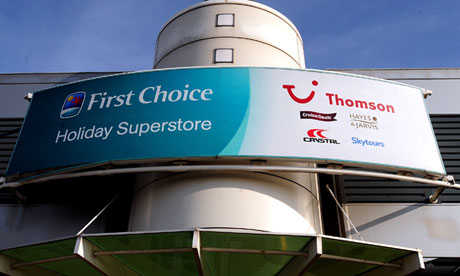Britain’s biggest travel company paid no UK corporation tax in its last financial year despite posting record annual profits on Tuesday.
Thomson and First Choice operator Tui Travel said it had been a year of “many successes”, with an 8% leap in underlying pre-tax profits to £390m.
But its UK corporation tax bill was zero as a result of losses incurred following a restructuring launched five years ago. It said it would start paying tax again once those losses have been carried forward and that it was paying the “right amount of corporation tax” in the countries in which it operates.
Details of its tax payments come amid an escalating row after it wasrecently revealed that Google, Amazon and Starbucks have been using legal schemes to avoid paying their fair share of tax in the UK.
Tui said it was “fully compliant with UK tax law”, adding that it expected to pay small amounts of UK corporation tax in 2013/14 with significantly larger amounts in later years as brought-forward losses were eliminated.
In Tuesday’s results, the company said the package holiday was enjoying a “renaissance” as customers opted for the certainty of all-inclusive deals rather than DIY trips. It also reported strong demand for holidays in 2013 as households look to avoid a repeat of this year’s wash-out UK summer.
However, like-for-like prices of holidays could rise by up to 2% next year as Tui faces up to cost pressures – such as higher fuel – of up to 10% in 2013.
Price rises and sales of more profitable package deals helped buoy the annual figures, with Tui seeing strong bookings for “unique” holidays, targeted at groups including couples and those looking for luxury all-inclusive resorts.
Tui added it was benefiting from difficulties at its rival Thomas Cook, which last week revealed plans to slash a further £100m in costs after suffering pre-tax losses of £485m.
Chief executive Peter Long said the year had been one of “many successes”.
“We have delivered record group profits, while the UK achieved outstanding results both in terms of profit and margin all against a backdrop of continued economic uncertainty,” he added.
UK holidaymakers looking to escape to the sun after this year’s dismal summer also resulted in a surge in bookings for next summer, up 12%.
Tui said its unique holidays – including Couples, Sensatori and SplashWorld – were already up 18% for summer 2013, accounting for 83% of bookings. Strong sales of these exclusive package deals offset a fall in UK and Ireland customer numbers in the year to 30 September, down 5% to 5.2 m.
It said average UK selling prices were up 4% this winter and 3% for next summer, while it also made £4m in savings over the year. For winter 2012, Tui said UK bookings were up 1%.
But it has slashed its capacity by 34% in France this winter and said bookings were down 28% amid “extremely challenging” trading in the country.
Shares rose 2% as Long said the group was aiming for earnings growth of between 7% and 10% over the next five years.
Analyst James Hollins at Investec Securities said Tui was trading well despite the threat of online rivals and low-cost carriers.
Tui said online bookings continued to increase, accounting for 44% of winter holidays booked in its UK division.
The group said Thomson was the second most visited travel website in the UK.
http://www.guardian.co.uk/business/2012/dec/04/tui-travel-paid-no-corporation-tax
.
.
Tui defends corporation tax as profit rises to £490m
5 December 2012
Tax experts have downplayed Tui Travel’s admission that it paid no corporation tax this financial year.
The tour operator posted a profit before tax of £390 million but said it had “no profits chargeable to UK corporation tax”.
It said this had been “eliminated due to capital allowances, losses brought forward from prior years as a result of restructuring and costs incurred by the ash cloud in 2010”.
Peter Long, Tui’s chief executive, said: “It’s very transparent, we’ve undertaken major restructuring during the past five years as we’ve brought two businesses together – and as a consequence we’ve got carry forward of unutilised tax losses, which are offset against our profits on a perfectly normal basis.”
Corporation tax has been a hot topic in recent weeks, with Amazon, Google and Starbucks grilled by MPs. However, Tui’s stance has been backed up by tax experts.
Jonathan Wall, managing director of Elman Wall, said: “I’d fully expect Tui to be paying the correct amount of tax. It’s complicated and cannot easily be deduced from either a company’s turnover or its profit.
Heather Self, tax director at Pinsent Masons, said: “Nothing in this [Tui’s results] sounds like avoidance. If you make a loss in one year you can use it against your profits in the next year,” she added.
Meanwhile, Tui said strong trading momentum from summer 2012 had continued into winter 2012-13.
http://www.ttgdigital.com/news/tui-defends-corporation-tax-as-profit-rises-to-490m/4686067.article
.
.
EasyJet and their tax
Their accounts for 2009 are at:

